Who was Achilles in Greek Mythology
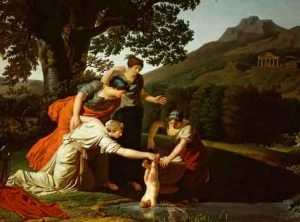
He was educated by the wise centaur Cheiron and was described as extremely handsome but also very emotional. He was almost immortal since his mother had dipped him into the river Styx as a baby.
Holding the child by its heel when putting it in the water, Thetis made Achilles’ whole body except the heel, immortal. He had a son, Neoptolemus, with the Skyrian princess Deidameia, who met her when he was hidden in the Palace of the king Likomidis on the island on Skyros.
In his childhood he was tutored by Phoenicus, son of King Amydorus and king of Dolopia, who taught him eloquence, martial arts and accompanied him to the Trojan War.
When the war against Troy was ignited by the kidnapping of Helen, Thetis learnt by an oracle that her son would not come back alive if he joined Agamemnon. The oracle had said that he would either die young and glorious, or reach old age in obscurity. Thetis then send Achilles to Skyros to the king Likomidis and disguise himself as a woman, thus becoming the first known cross-dresser, but unfortunately he was revealed by Odysseus and forced to join the army against Troy.
Odysseus managed to reveal Achilles true identity by dressing as a merchant, then filling a cart with weapons, clothing and perfumes. While the women ran to see the clothes and perfumes, Achilles ran to the weapons. According to another version, Odysseus blew a horn, which made all the women flee except Achilles.
Meaning of the name of Achilles
Achilles has a name, which has a genuine Mycenaean origin, since it appears on the Mycenaean plates of the Bronze Age as the name of everyday people in Knossos and Pylos. In the past, there was a tendency to associate the particular name with the first element of the name of the rivers Acheloos and Acheron, where the root “Ach” would be associated with the meaning “water”.
Today this view has been generally abandoned and most experts associate the name with the root of the word anxiety (pain, sadness, sorrow, anxiety, agony, sorrow).Some studies consider the name to be compound by the word, anxiety + army, and in this case the name would mean “the one who causes anxiety in the army”
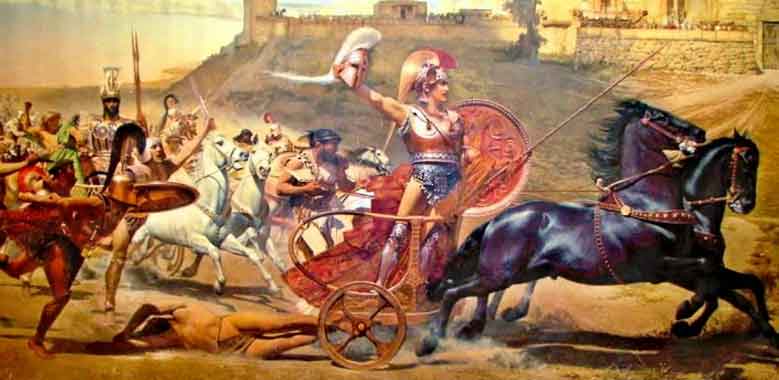
The most important feats associated with Achilles’ presence in Troy
Troilus was the younger son of Hecabe and Priam or Apollo, and according to tradition, if Troilus reached the age of twenty, Troy could not be conquered by anyone. Homer knows about the death of Troilus, but it is recounted in detail in Cyprus.
Polyxeni, together with her brother Troilos who was on horseback, had gone out to get water from the spring. Achilles chased him, overtook him, though on foot, jumped on the horse, grabbed him by the hair and threw him to the ground. Then he dragged him to the altar of the Thymbraian Apollo – and killed him. After the fall of Troy, Polyxene will be sacrificed in the tomb of Achilles, by Neoptolemus.
When the Achaean fleet arrived at Troy, no one dared to leave their ship because Achilles’ mother, Thetis, had said that whoever set foot on the ground first would be killed immediately, while at the same time a group of Trojans led by Hector stoned the ships of the Achaeans. Achaean. The solution to the problem was given by Odysseus who, leaving the ship, threw his shield on the ground and stepping on it canceled the oracle of Thetis.
Protesilaus did the same but accidentally touched the ground and was instantly killed by Hector’s spear. After this event, the Achaeans, satisfied with the solution of the oracle, but also saddened by the death of their friend, disembark and the war begins.
During the battle Achilles duels with the Cygnus who had the ability to not be hurt by a bronze weapon. But Achilles defeats him by throwing a large stone at his head. The duel in question was so fierce that it is remembered together with the battles against Hector and Memnon.
Hetion was king of Cilician Thebes, had seven sons and was the father of Andromache, wife of Hector. He was killed by Achilles during the latter’s raid on Thebes (Iliad rhapsody G) along with his sons. Achilles respected Aetion and allowed him to be buried in a magnificent mound.
When the Greeks sailed for Troy, they accidentally stopped at Mysia, werre Telephos was king. In the battle, Achilles wounded Telephos. The wound did not close and so Telephos asked an oracle which stated that “the one who hurt will heal”. According to reports of others about the lost work of Euripides, Telephos went to Avlis, pretending to be a beggar and asked Achilles to heal his wound. Achilles denied him, claiming he had no medical knowledge.
Alternatively, Telephos held Orestes hostage in exchange for Achilles’ help in healing the wound. Odysseus concluded that the spear created the wound so the spear should heal it. Scratches from the spear were placed on the wound and Telephos was healed.
The army of Achilles
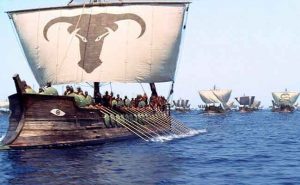
After an argument with king Agamemnon, who had taken Briseis, a beautiful hostage, from Achilles – the hero was so upset that he pulled out of the war.
His abcense from the battle field gave courage to the Trojans, who no longer having to face Achilles, began to gain ground and cause a lot of suffering to the Greeks.
Achilles’ shield
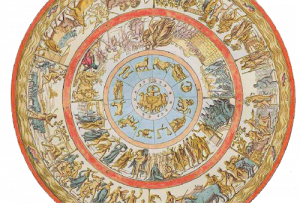
In the other state they have a war. Inside the city the women, children and old men have stayed, while outside the walls two armies have fallen into battle. The wounded and the dead lie all around.
So Hephaestus tells the story of the joys of peace and the miseries of war. Then he puts the farmers plowing their fields, the laborers harvesting with sickles, he puts vines laden with grapes and people who harvested them while singing, he puts shepherds tending their flocks , features dancing boys and girls with flowers in their hair. And all around he makes the vast Ocean sparkle. And when he is done, he stands to look at her.
He knows that if people notice the beauty of the shield, they will no longer want to fight. They will want to dance and sing, plow their fields, harvest their vines and tend their flocks. They will want to live in peace. And it is this shield of Achilles that is the first, the only weapon ever made that does not invite war but peace.
Achilles anger and his retreat from the battlefield
In the tenth year of the Trojan War, Achilles and Agamemnon argued over two beautiful slaves, Chrysides and Briseis. This brought many calamities to the Achaeans. Chryseis was Agamemnon’s slave. However, Chrysis, the father of Chrysisida, begged Apollo to punish the Achaeans severely. Apollo heard him from Olympus and immediately took his bow and went to the camp of the Achaeans. He sat aside and, unseen, he shot animals and people with his arrows.
Then a terrible disease fell among them and the Achaeans died, one after the other. The evil lasted nine days. On the tenth day the kings asked the soothsayer Calchas to tell them why such calamity befell them. He said that Apollo was angry because Agamemnon did not respect Chrysis. To stop the evil, Agamemnon sent Chryseis back to her father. However, he ordered Achilles’ slave, Briseis, to be brought to his tent.
Achilles kept Briseis for himself, not bringing her before everyone as was customary with spoils. This caused the grief and anger of the rest of the Achaeans.
However, according to the Homeric version, the removal of the daughter caused the anger and grief of Achilles, who withdrew from the battle, as a result of which the Trojans were defeated and many Achaeans were killed and their bodies were eaten by birds of prey. and animals.
In the meantime, Agamemnon sent the heralds of Eurybates and Talthybius to ask Achilles for Briseis. Both of them reluctantly carried out Atreides’ command and showed shyness and fear in front of Achilles, who however received them with the respect due to preachers carrying out orders and asked Patroclus to lead the daughter to them. She again followed them sadly, which indicates the feelings and will of the daughter:
Dion Chrysostomos, author of the 1st AD, supports this emotional reaction of the daughter. c., the opinion that Briseis, despite the murder of her own, probably loved Achilles (Log. 61.7.2 and 16.4). And Plutarch, a writer of the same century, emphasizes about Achilles how, when Briseis is taken from him “away from his companions / he collapses and immediately bursts into tears (Ethics 26 E9), “tarnishing” the image of the hero.
When Patroclus was killed by Hector, Achilles re-entered the battle, and, after killing Hector, Agamemnon, along with many other gifts, returned Briseis to him, even swearing that as long as she remained near him he had never touched her
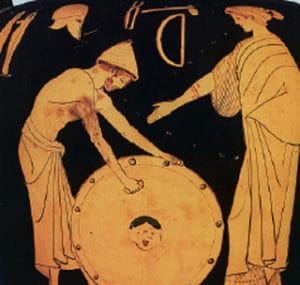
Eventually only the entreaties of his closest friend Patroclus made him retreat and gave him his great armor that it was made by the god Hephaestus to fool the Trojans, that supposedly was Achilles who took part in the battle.
But Hector understood that he was not Achilles and during the battle that followed he killed him and took his armor.
Achilles and Patroclus
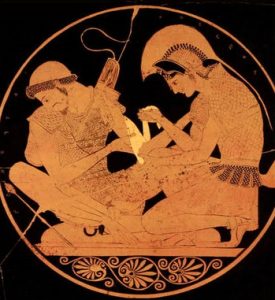
Thetis and the Nine Muses attended Achilles funeral. In the underworld Achilles remained a leader, but it was not a happy existence. According to another version, the hero was taken to Elysium by his mother, where he married Helen or Medea. Yet another myth tells us that his shadow asked Polyxene to be present at his funeral. She was a Trojan princess who, despite him killing her brother, had fallen in love with Achilles. Polyxene went willingly to the funeral pyre, where the Greeks killed her.
Achilles was worshiped as a hero in Thessaly, but also throughout ancient Greece.
Duel of Achilles and Hector
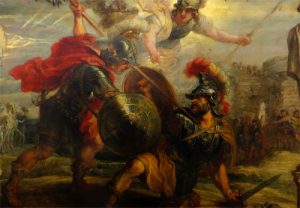
Negative and defeatist feelings caused him to hesitate, he put it on his feet and Achilles followed him – three times they circled the walls. The goddess Athena then took the form of Diphobus and encouraged him to fight, telling him that they would face Achilles together. The ultimate purpose of the goddess was to provoke the duel and the death of Hector. Hector was convinced by his (her) words, suppressed his fear and met Achilles outside the walls of Troy.
He even demanded that they observe the unwritten law of war and agree that the winner of the duel would not dishonor the body of the loser. Achilles, also filled with negative feelings about the loss of Patroclus, refused abusively. Achilles threw his javelin first, but Hector dodged it and immediately responded by also throwing a javelin that found Achilles’ shield, but did not penetrate it.
Athena meanwhile gave back the spear to Achilles, while Hector who turned looking at the walls and looking for Diphobos to give him a new spear realized that his presence earlier was a divine trick. The weighing of the souls of the two heroes by Zeus, the psychostasis, showed that Hektor’s time had come – his disk reached down to Hades, Apollo abandoned him.
Now aware of his end, Hector did not give up. He said he would fight to the death and that future generations would know how brave he was. Wearing the armor of Achilles, which he had taken from the dead Patroclus, he rushed at his opponent.
He again, well aware of her weak points, plunged the spear into an open spot in Hector’s neck, but poetically his vocal chords were not cut, so that Achilles could hear him prophesy his end from Paris before the Shadow Gates but also his request to hand over his body to his relatives. He fell dead after first hearing Achilles’ abusive refusal to do justice.
Achilles drew the spear from his dead body, as did the blood-stained weapons. The enraged punisher had in mind to behead the murderer of Patroclus and offer him his head, but the poet, mindful of Priam’s plea, could not allow it.
Tragic moments were spent by Hector’s parents and wife, Andromache, who had just climbed the walls and witnessed the horrible sight: Achilles dragging the dead Hector around the walls of Troy in his chariot, celebrating his victory abusively. Much of the emotion and effectiveness of the scene is derived from the contrast of Hector’s unconscious corpse and the petty malice of those who ran away from him while alive; only now that he is dead do they confront him.
And they even stabbed the body of the dead man and beat him, as they talked to each other, trying to realize the magnitude of the success, with a rigid indifference or even hatred contrasted with the beauty of the dead man in verses of astonishing power. Accordingly, Andromache’s embroidery with the symbols of life and hope denied her by the gods contrasts with what had actually happened to her husband.
“The poet emphasizes the greatness of Hector by describing the smallness of the crowd,” says Wilamowitz. “The stabbing of the corpse may ultimately stem from a desire to ensure that the dead man is indeed dead and that his ghost cannot harm his enemies after death,” Richardson points out. And Griffin: “The bitterness of abuse is intensified by the power of the enemy to carry it out in his own country, before the eyes of his people”.
Achiles and Memnon
Memnon’s presence in Troy is placed in time after the death of Hector and the Amazon Penthesilea by Achilles and is mentioned in the Aethiopida (work of the Trojan cycle attributed to Arctinus of Miletus) and the Little Iliad (work of the Trojan cycle attributed to the Club of Pyrrha).
Memnon who was the son of Heus arrived in Troy at the head of an Ethiopian body wearing armor made by the god Hephaestus, as did Achilles since both were children of gods. Memnon’s army and fighting spirit briefly revived the morale of the Trojans.
He dueled with Aiatus without a winner emerging, as in the case of Aiatus and Hector. Memnon killed Antilochus, Nestor’s son, while he was trying to protect his father, as one of the horses, having been hit by Memnon’s arrows, had immobilized the chariot of the king of Pylos and he trying to free his chariot he was seriously threatened by Memnon who was about to throw a spear at him. Then Nestor called his son who rushed to save his father.
Memnon struck him with his javelin, and around the body of the brave and dear friend of Achilles, he was the most beloved after the death of Patroclus, a fierce battle took place, so that the body would not be captured by the Trojans.
Although Thetis informed her son that if he killed Memnon he was destined to be killed soon after, Achilles decided to fight with Memnon, armed himself, entered the battle and took the lifeless body of Antilochus to be buried his own as it should be.
When the duel began, the two immortal mothers, Heos and Thetis, rushed to Zeus, worried about the fate of their sons. Then he weighed the fates of the two heroes and the scales tipped in favor of Memnon. Achilles managed fatal blows to Memnon that brought down the hero.
The death of Achilles
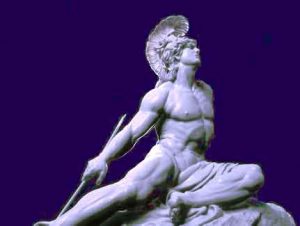
His mother, Thetis, when he was young, had made him immortal by immersing him in the enchanted waters of Lake Styx.
However, his right heel was not wet, because it was holding him back from there. So Paris marked Achilles and stuck a medicated arrow in his right heel. Groaning, the hero knelt on the ground. With pained cries he tried to pull the arrow from his heel. After a while he collapsed dead.
A fierce battle took place around his dead body. The Trojans were fighting to take him. However, Odysseus and Aedas grabbed him and brought him to the ships. All the Achaeans mourned the loss of the hero. Suddenly there was a terrible roar from the sea and out of the waves came Thetis and the Nereids, her sisters.
They all stood around the dead body. For seventeen days they cried and cursed him. Then they burned his body, put his bones in the same pot as Patroclus’s, and, to honor him, held games.
After a few days, Paris was also killed. He was killed by Philoctetes with one of the poisoned arrows that Herakles had given him.
